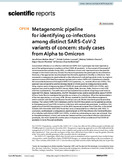Mostrar el registro sencillo del ítem
Metagenomic pipeline for identifying co-infections among distinct SARS-CoV-2 variants of concern: Study cases from Alpha to Omicron
| dc.creator | Molina Mora, José Arturo | |
| dc.creator | Cordero Laurent, Estela | |
| dc.creator | Calderón Osorno, Melany | |
| dc.creator | Chacón Ramírez, Édgar | |
| dc.creator | Duarte Martínez, Francisco | |
| dc.date.accessioned | 2022-03-02T13:55:32Z | |
| dc.date.available | 2022-03-02T13:55:32Z | |
| dc.date.issued | 2022 | |
| dc.identifier.citation | https://www.nature.com/articles/s41598-022-13113-4 | es_ES |
| dc.identifier.uri | https://hdl.handle.net/10669/85938 | |
| dc.description.abstract | Concomitant infection or co-infection with distinct SARS-CoV-2 genotypes have been reported as part of the epidemiological surveillance of the COVID-19 pandemic. In the context of the spread of more transmissible variants during 2021, co-infections are not only important due to the possible changes in the clinical outcome, but also the chance to generate new genotypes by recombination. However, a few approaches have developed bioinformatic pipelines to identify co-infections. Here we present a metagenomic pipeline based on the inference of multiple fragments similar to amplicon sequence variant (ASV-like) from sequencing data and a custom SARS-CoV-2 database to identify the concomitant presence of divergent SARS-CoV-2 genomes, i.e., variants of concern (VOCs). This approach was compared to another strategy based on whole-genome (metagenome) assembly. Using single or pairs of sequencing data of COVID-19 cases with distinct SARS-CoV-2 VOCs, each approach was used to predict the VOC classes (Alpha, Beta, Gamma, Delta, Omicron or non-VOC and their combinations). The performance of each pipeline was assessed using the ground-truth or expected VOC classes. Subsequently, the ASV-like pipeline was used to analyze 1021 cases of COVID-19 from Costa Rica to investigate the possible occurrence of co-infections. After the implementation of the two approaches, an accuracy of 96.2% was revealed for the ASV-like inference approach, which contrasts with the misclassification found (accuracy 46.2%) for the wholegenome assembly strategy. The custom SARS-CoV-2 database used for the ASV-like analysis can be updated according to the appearance of new VOCs to track co-infections with eventual new genotypes. In addition, the application of the ASV-like approach to all the 1021 sequenced samples from Costa Rica in the period October 12th - December 21th 2021 found that none corresponded to co-infections with VOCs. In conclusion, we developed a metagenomic pipeline based on ASV-like inference for the identification of co-infection with distinct SARS-CoV-2 VOCs, in which an outstanding accuracy was achieved. Due to the epidemiological, clinical, and molecular relevance of the concomitant infection with distinct genotypes, this work represents another piece in the process of the surveillance of the COVID-19 pandemic in Costa Rica and worldwide. | es_ES |
| dc.description.sponsorship | Universidad de Costa Rica/[803-C0-196]/UCR/Costa Rica | es_ES |
| dc.language.iso | eng | es_ES |
| dc.source | Research Square, pp.1-20. | es_ES |
| dc.subject | COVID-19 | es_ES |
| dc.subject | SARS-CoV-2 | es_ES |
| dc.subject | Co-infection | es_ES |
| dc.subject | Omicron | es_ES |
| dc.subject | Variant of concern | es_ES |
| dc.subject | Delta | es_ES |
| dc.title | Metagenomic pipeline for identifying co-infections among distinct SARS-CoV-2 variants of concern: Study cases from Alpha to Omicron | es_ES |
| dc.type | artículo original | es_ES |
| dc.identifier.doi | 10.21203/rs.3.rs-1389767/v1 | |
| dc.description.procedence | UCR::Vicerrectoría de Docencia::Salud::Facultad de Microbiología | es_ES |
| dc.description.procedence | UCR::Vicerrectoría de Investigación::Unidades de Investigación::Ciencias de la Salud::Centro de Investigación en Enfermedades Tropicales (CIET) | |
| dc.identifier.codproyecto | 803-C0-196 |
Ficheros en el ítem
Este ítem aparece en la(s) siguiente(s) colección(ones)
-
Microbiología [1171]


